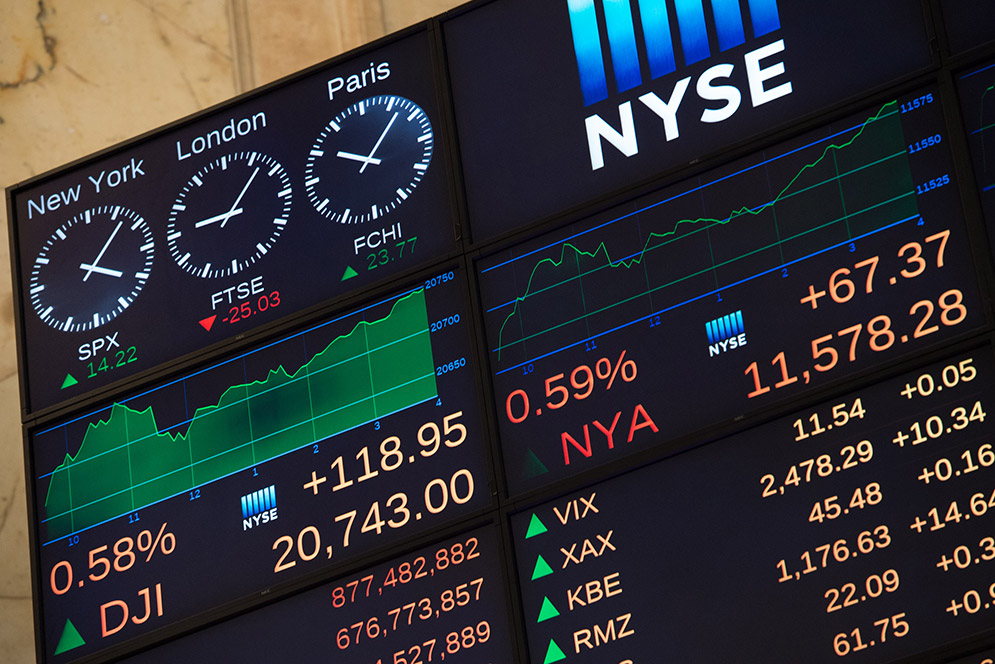Stock Market Crash Likely, BU Economist Predicts
President Trump will be bad for business, says Kotlikoff

BU economist Laurence Kotlikoff fears Trump’s policies will trigger an imminent crash in stock markets, aborting the record price run-up in equities. Photo by Bryan R. Smith/AFP/Getty Images
Despite the fact that the stock market has entered record territory, BU economist Laurence Kotlikoff recently sold all of his stocks. You should, too, he says, if you want to avoid a coming market crash.
Kotlikoff, a William Fairfield Warren Distinguished Professor and a College of Arts & Sciences professor of economics, made that grim prediction recently in his weekly syndicated column, which runs in 30 papers around the country, including the Dallas Morning News and the Seattle Times.
“If your stocks and long bonds are in retirement accounts, transfer them to short-term Treasurys,” he wrote.
Designated one of the world’s most influential economists by The Economist, Kotlikoff is being starkly contrarian to those who believe US businessman-turned-president Donald Trump is encouraging the market’s run-up with business-friendly promises, such as big government spending on infrastructure and rolling back regulations.
Au contraire, Kotlikoff argues, any number of Trump policies—protectionism (such as his abandoning the Trans-Pacific Partnership), curbs on immigration, and the global outrage they threaten to unleash—could cause the bottom to fall out of what he calls an already overheated stock market.
At least one admirer of Kotlikoff—financial author Dan Solin—thinks he’s wrong, and Kotlikoff himself opened his column by noting that “smart economists never predict the stock market.” So why is he predicting an imminent crash? He discussed that with BU Today.
BU Today: Why do you believe the market will crash?
Kotlikoff: The market is at an all-time high, the price-earnings ratio is historically very high. Trump could produce a massive deficit that raises interest rates; the banks could lend out their enormous excess reserves and cause massive inflation and much higher interest rates; Trump could start a trade war; he could precipitate a boycott of the United States by foreign tourists; he could precipitate a boycott of US-made goods by both foreigners and Americans; and he could continue to increase the level of uncertainty. None of these things leads one to predict yet higher stock prices.
There are also elements in the new tax bill, which the House may pass, that should dampen stock values, but that the Wall Street bears don’t yet seem to get.
Some analysts believe the market is going gangbusters because business expects business-friendly policies from Trump. Can you explain why you think the president will be bad for stocks?
Whatever business-friendly views of Trump exist, they were there the day he was elected. He hasn’t said or done anything new on this front since he was elected. It’s very hard to understand why the market continues to rise at this point.
Trump, if anything, has shown himself to be what he advertised—an autocrat, a know-it-all, a person with a tenuous grip on reality, a narcissistic personality, someone who feels free to interfere in private business decisions. Someone who is willing to bully defenseless illegal immigrants but can’t stand up to North Korea (which just crossed his proclaimed “THAT WON’T HAPPEN” red line tweet with respect to the testing of nuclear-capable ballistic missiles), and someone who has directly or indirectly insulted many of the world’s leaders.
Ripping up pending trade agreements, trying to destroy the North American Free Trade Agreement (NAFTA), advocating tariffs that will get us kicked out of the World Trade Organization—these are the acts of an economic madman. If the traders on Wall Street think this is good for our economy, they are about as foresighted as they were on September 14, 2008, the day before Lehman failed.
Some argue that a prudent reaction to the market’s run-up is to reduce the percentage of your portfolio that is in stocks, rather than a massive stock dump.
I rarely suggest timing the market. But I pulled every penny out of the market two weeks back and recommend others take similar cover. This all smells like a bubble that will burst as soon as, say, Elton John and 50 other top celebrities hold a public press conference urging people around the world to avoid travel to the United States until it takes in its fair share of Syrian and other refugees and stops deporting illegal immigrants without due process, or to buy nothing made in America. That or something like it could happen any day.
You make your online retirement planner free to BU employees. How is it factoring in your belief that people should unload their stocks?
You can run our ESPlannerPLUS software and see how much your sustainable living standard would drop were your stocks to drop by 25 to 50 percent. This will provide a sense of the risk that staying in the market may entail.
Mind you, I may be entirely wrong. Bubbles are irrational phenomena, and when precisely they burst is not predictable. Nor can anyone prove that a particular market is valued based on irrational beliefs. But as I said, I’ve pulled out of the market to wait till the dust settles.

Comments & Discussion
Boston University moderates comments to facilitate an informed, substantive, civil conversation. Abusive, profane, self-promotional, misleading, incoherent or off-topic comments will be rejected. Moderators are staffed during regular business hours (EST) and can only accept comments written in English. Statistics or facts must include a citation or a link to the citation.